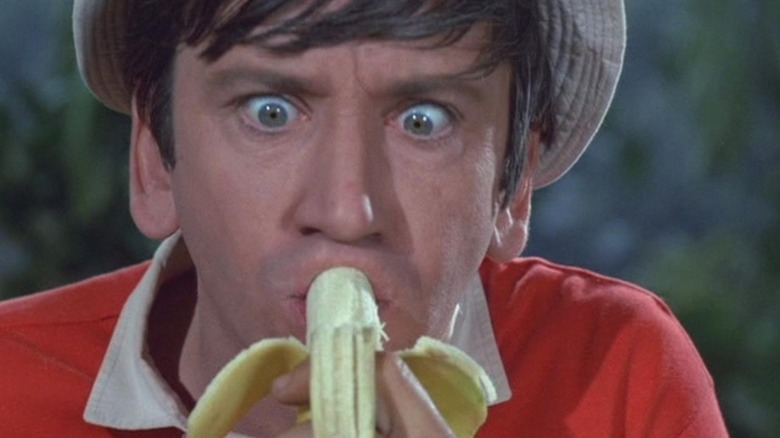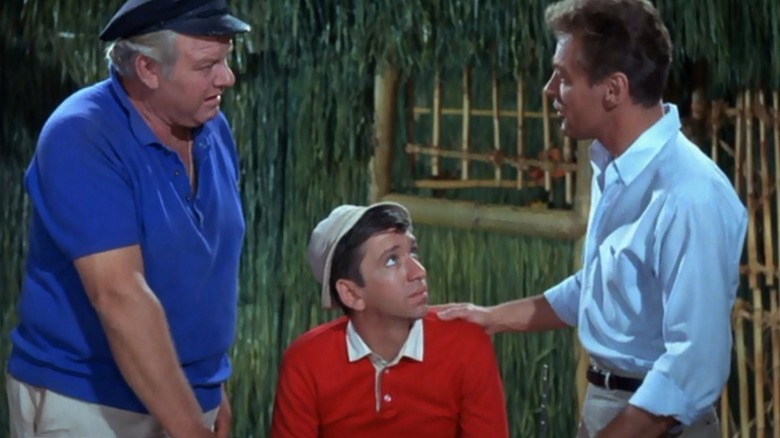Gilligan's Island Creator Set The Record Straight On A Rumor Over The Show's Origin
"The Ballad of Gilligan's Isle" remains, even at this late date, one of the best TV theme songs of all time. It did its job in an exemplary fashion, explaining the premise of the series and introducing all the characters, all with one of the catchiest earworms ever conceived. The song was written by "Gilligan's Island" creator Sherwood Schwartz and composer George Wyle. The original idea for "The Ballad of Gilligan's Isle" was to give it a more upbeat, calypso sound, so a "tropical" theme was composed for the original "Gilligan's Island" pilot episode. However, Schwartz eventually changed gears on the song, feeling that a sea shanty would be better placed. It was a wise decision.
Additional verses for "The Ballad of Gilligan's Isle" can be heard over the show's closing credits, with one notable lyric having left fans speculating on the classical origins of the series for many years. "No phones, no lights, no motorcars," the song goes, "not a single luxury. Like Robinson Crusoe, it's primitive as can be." The singers of the ballad, a rock group called The Wellingtons, pronounce "Crusoe" with three syllables so that it fits the song's meter.
That lyric, for many, was an open declaration that Sherwood Schwartz adapted "Gilligan's Island" from Daniel Dafoe's 1719 novel "The Life and Strange Surprizing Adventures of Robinson Crusoe, of York, Mariner: Who lived Eight and Twenty Years, all alone in an un-inhabited Island on the Coast of America, near the Mouth of the Great River of Oroonoque; Having been cast on Shore by Shipwreck, wherein all the Men perished but himself. An Account how he was at last as strangely deliver'd by Pyrates. Written by Himself."
In a 1997 interview with the Television Academy, Schwartz wanted to clear up that "Gilligan's Island" was not based on Robinson Crusoe.
Gilligan's Island didn't begin as a comedic Robinson Crusoe
Schwartz noted in the interview that he was searching for a TV premise that would unite disparate characters and force them to interact. He liked the idea of seven people, all from different walks of life, trapped in the same place, trying to form relationships. He thought for a moment that everyone might work in the same office, perhaps, but that wasn't doable because, well, someone might get fired or merely go home. "Where could they be," Schwartz asked himself, "where they had to get along with each other?" Is seems that stranding them all on a desert island was the perfect solution.
The "Robinson Crusoe" parallels, he explained, were just a coincidence:
"A lot of people think that I read 'Robinson Crusoe' and that's where I got the idea for 'Gilligan's Island.' Now, it does happen that 'Robinson Crusoe' is a favorite book of mine, but that's not what started it. I think those people who believe that have put the cart before the horse. I was looking for a way that seven people — I don't know why I fix on the number seven, but that's what I did — where could they be that they couldn't leave each other."
Two sailors, an intellectual, a farmgirl, two millionaires, and an actor. That was Schwartz's ensemble. The sailors, it seems, would necessarily have to be the final characters to enter the equation, as they would be carried along with the premise. The character work was conceived of first. That means Gilligan himself the last one to join Schwartz's ensemble. Or perhaps the Skipper. Which was a good thing because, as "Weird Al" Yankovic once sang, I'm 'n Love (wit da Skipper).

